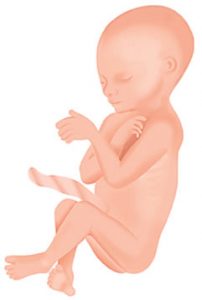 By now your baby’s head will be covered with lanugo. Fingernails are well formedand your babys toenails will also begin to grow this week. Your baby’s bodywill also begin to grow faster than the head now and his/her body will become morein proportion to a normal body ratio.
Your babys head and neck muscles continue to get stronger and stronger, and thisresults in your baby’s head being more erect in a straight line.
Alpha Protein Testingis usually carried out between weeks 16 and 18. The timing of this test is veryimportant and must be correlated to your gestational age and your weight, otherwisethe results may not be accurate.
An elevated level of alpha protein may indicate problems with your baby, such asspina bifida, (spinal cord problem), or anecephaly, (central nervous system defect).Some researchers have found a direct association between alpha protein and DownSyndrome.
Should the alpha protein tests return an abnormal result, a careful ultrasound willbe done to look for signs of spina bifida, anecephaly or down syndrome.
Your development
This week your uterus will be weighing about 83/4 ounces(3.73kg’s) and will be 3 inches (7.62cm) below your belly button. One of theadvantages of your uterus moving higher up is that you may notice less pressureon your bladder, and so you will not be feeling like you constantly need to urinate.
You may notice that your breast begin to leak a clear fluid – this is not colostrum- as this will only appear towards the end of week 18. This is usually a build upof fluid which has accumulated in your mammary glands as a result of the changinghormones over the course of your pregnancy so far.
By now your baby’s head will be covered with lanugo. Fingernails are well formedand your babys toenails will also begin to grow this week. Your baby’s bodywill also begin to grow faster than the head now and his/her body will become morein proportion to a normal body ratio.
Your babys head and neck muscles continue to get stronger and stronger, and thisresults in your baby’s head being more erect in a straight line.
Alpha Protein Testingis usually carried out between weeks 16 and 18. The timing of this test is veryimportant and must be correlated to your gestational age and your weight, otherwisethe results may not be accurate.
An elevated level of alpha protein may indicate problems with your baby, such asspina bifida, (spinal cord problem), or anecephaly, (central nervous system defect).Some researchers have found a direct association between alpha protein and DownSyndrome.
Should the alpha protein tests return an abnormal result, a careful ultrasound willbe done to look for signs of spina bifida, anecephaly or down syndrome.
Your development
This week your uterus will be weighing about 83/4 ounces(3.73kg’s) and will be 3 inches (7.62cm) below your belly button. One of theadvantages of your uterus moving higher up is that you may notice less pressureon your bladder, and so you will not be feeling like you constantly need to urinate.
You may notice that your breast begin to leak a clear fluid – this is not colostrum- as this will only appear towards the end of week 18. This is usually a build upof fluid which has accumulated in your mammary glands as a result of the changinghormones over the course of your pregnancy so far.
 It is not uncommon for pregnant women to suffer from nasal congestion, which can lead to headaches, increased sensitivity to allergies and other discomforts.Some women report that drinking ginger herbal tea often helps relieve nasal congestion.
You may also have an amniocentesis test performedbetween weeks 16 and 18 if your health care provider has offered or suggested thisto you. This is done by passing a needle through the abdominal wall into the uterusand drawing amniotic fluid, generally about 30ml.
It is not uncommon for pregnant women to suffer from nasal congestion, which can lead to headaches, increased sensitivity to allergies and other discomforts.Some women report that drinking ginger herbal tea often helps relieve nasal congestion.
You may also have an amniocentesis test performedbetween weeks 16 and 18 if your health care provider has offered or suggested thisto you. This is done by passing a needle through the abdominal wall into the uterusand drawing amniotic fluid, generally about 30ml.

- Chromosomal problems
- Fetal sex complications
- Skeletal diseases
- Fetal Infections
- Hematologic (blood) diseases
- Inborn metabolism complications
Pregnancy Week 16


